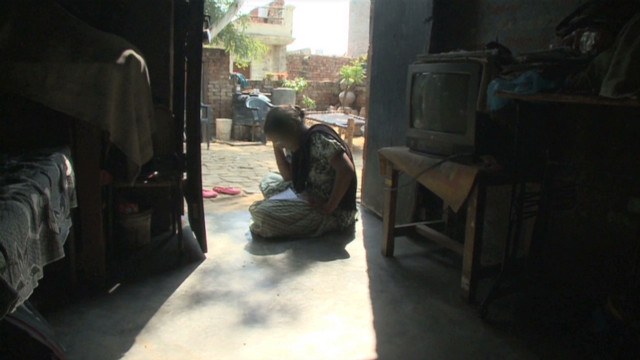Story highlights
- The teenager kept her rape ordeal secret for 10 days
- When her father heard about his daughter's suffering he killed himself by swallowing pesticide
- Local police say rape incidents have fallen in Haryana over recent months, and that recent cases have attracted "hype"
- Women's rights groups say there is an increasing gap between the number of men and women in Haryana
She's just 16 years old and one month ago was about to sit her final-year exams when she says she was shoved into a car and gang-raped by eight men in a small village in the Indian state of Haryana.
"I remember being driven by the canal, all the guys were standing there then four more boys came on a motorbike," said the teenager, who had been hoping to be the first female high school graduate in her family.
"There were approximately 12 men. Eight men raped me, they then fed me a pill, they filmed the whole thing and left."
The teenager kept her ordeal secret for 10 days before her mother noticed something was wrong.
"She would just lie in bed all day, she wouldn't talk, she wouldn't eat, I thought she was ill. Those rapists had threatened to kill our family and show the video to the entire village if she opened her mouth," she said.
The 16-year-old's mother also remained silent.
"People told me to forget about what had happened. They said this is a matter of your daughter's reputation. Who will marry her if people find out she was raped? Let it be, don't make a big deal," she said.
When her father heard about the rape video, he couldn't live with the thought of his daughter's pain and how she would be judged by society, her mother said.
He committed suicide by swallowing pesticides.
Devastated by his death, the teenager vowed to seek justice, not only for herself but other rape victims in Haryana, many of whom are too scared to report the crime.
"It happens a lot with dalit [lower caste] girls but they keep quiet because they fear for their reputation. I probably would not have spoken up either but I didn't want my father's sacrifice to go to waste," she said.
Police say all eight of the accused rapists have been arrested and are awaiting trial.
In the past month, at least 17 other young women have reported rapes in Haryana, a relatively sparsely-populated state in the country's northwest.
In 2011, 733 rapes were reported throughout the state, a fraction of the 24,206 cases alleged throughout the country over the full year. While more than 24,000 rapes were reported, convictions were only recorded for just over one quarter of cases, according to the National Crime Records Bureau (NCRB).
Local police say the incidence of rape has fallen in Haryana over recent months, and that recent cases have attracted "hype."
"The nature of the crime created hype in the number of rape cases registered in Haryana," said Satish Balan, Police Superintendent of the Hisar district. "In two cases there were suicides which led to media coverage of rapes in Haryana otherwise the number of rapes registered has come down by 15%. This is the truth."
Some local politicians blame progress and the proliferation of modern technology like mobile phones, internet, television and films for encouraging sex attacks.
However, women's rights groups say the increasing gap between the number of men and women in Haryana is one of the main contributors.
The 2011 National census revealed there were 877 females for every 1,000 males in the state, compared with the national ratio of 940 females to 1,000 males. High incidences of female feticide in Haryana are largely to blame for the imbalance, say rights groups, who say families traditionally value boys over girls.
The khap panchayats, or the self-appointed village caste councils, which have no legal authority, have suggested that lowering the legal age for marriage could cut the incidences of rape.
"The marriageable age for girls, which is 18 right now should be changed to 16 or 15 so then these cases will decrease, these will be stopped," council member Jitendra Chhattar told CNN.
The United Nations says lowering the marriageable age is not a solution.
In an open letter to the country's minister for Women and Child Development, Krishna Tirath, four U.N. agencies urged the Indian government to give the issue urgent attention.
"Child marriage is not a solution to protecting girls from sexual crimes including rape. In fact, child marriage denies a girl of her childhood, disrupts her education, limits her opportunities, increases her risk to be a victim of violence, jeopardizes her health and therefore constitutes an obstacle to the achievement of nearly every Millennium Development Goal and the development of healthy communities," the letter said.
Tirath told CNN in an interview Thursday that she strongly condemned the cases of rape being reported in Haryana.
"I will be taking the issue up with the Chief Minister of Haryana to take strict and stringent action to ensure that safety and security of women is not compromised in anyway. We are already working on the issues on the child-sex ratio and giving it the highest priority," she said.





